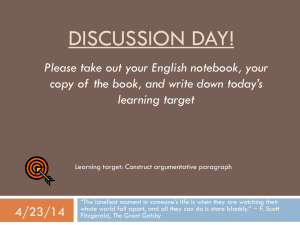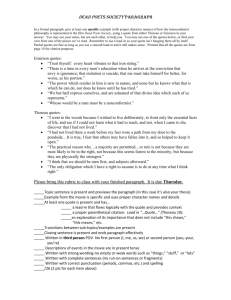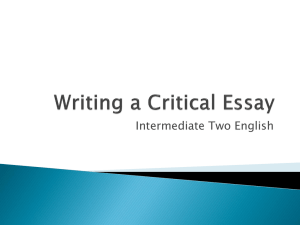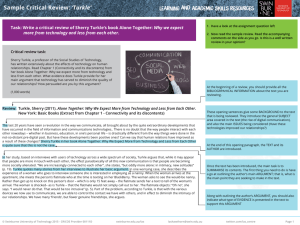File
advertisement
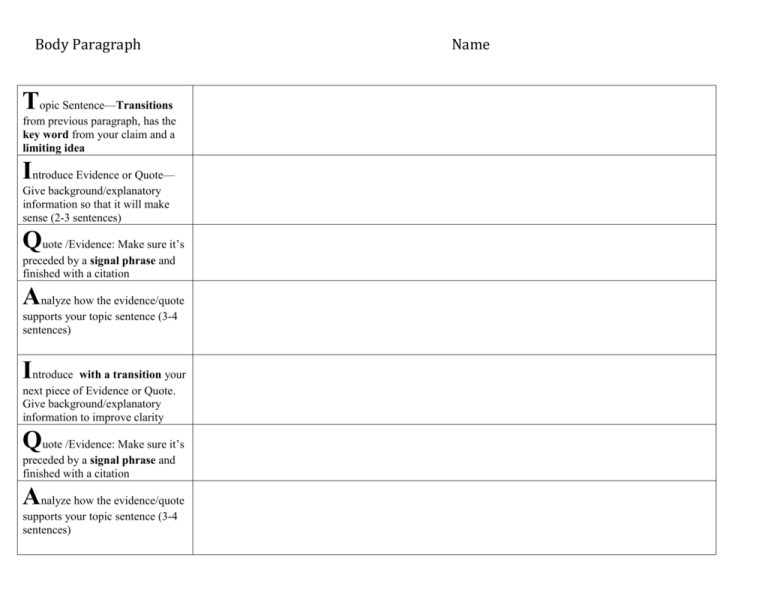
Body Paragraph Topic Sentence—Transitions from previous paragraph, has the key word from your claim and a limiting idea Introduce Evidence or Quote— Give background/explanatory information so that it will make sense (2-3 sentences) Quote /Evidence: Make sure it’s preceded by a signal phrase and finished with a citation Analyze how the evidence/quote supports your topic sentence (3-4 sentences) Introduce with a transition your next piece of Evidence or Quote. Give background/explanatory information to improve clarity Quote /Evidence: Make sure it’s preceded by a signal phrase and finished with a citation Analyze how the evidence/quote supports your topic sentence (3-4 sentences) Name Body Paragraph Topic Sentence—Transitions from previous paragraph, has the key word from your claim and a limiting idea Introduce Evidence or Quote—Give background/explanatory information so that it will make sense (2-3 sentences) Quote /Evidence: Make sure it’s preceded by a signal phrase and finished with a citation Analyze how the evidence/quote supports your topic sentence (3-4 sentences) Introduce with a transition your next piece of Evidence or Quote. Give background/explanatory information to improve clarity Quote /Evidence: Make sure it’s preceded by a signal phrase and finished with a citation Analyze how the evidence/quote supports your topic sentence (3-4 sentences) Name While technology allows us to foster more connections faster with other people (TRANSITION FROM CONCESSION), it overwhelmingly restricts our ability to initiate and maintain meaningful interactions with other humans. (LIMITED TO MAINTAINING MEANINGFUL INTERACTIONS) This idea that online and technology-based interactions impair our ability to have deeply human interactions with others is in Turkle’s article, “The Flight from Conversation.” (INTRODUCTION) Turkle suggests that frequent, short interactions, which she describes as “sips,” are not a replacement for genuine, nuanced, vulnerable conversations with other humans. She notes that these “sips” do not add up over time to a satisfying “gulp” of human conversation and connection. (BACKGROUND INFORMATION ABOUT THE ARTICLE) Turkle argues that (SIGNAL PHRASE), “we expect more from technology and less from one another and seem increasingly drawn to technologies that provide the illusion of companionship without the demands of relationship” (3). (CITATION) This suggests that the messiness and risk that comes with fostering strong relationships with others requires significant real interaction with those individuals. (CONNECTION TO MEANINGFUL INTERACTIONS) Turkle concludes that we need to place ourselves in face-to-face conversational opportunities to have a chance to be as we really are in front of others. It is in these vulnerable situations that we are at in a position to be known for who we truly are. Without these meaningful conversations where we are able to learn from self-reflection and the voice of another person speaking into our life, we will keep living with many elusive relationships, which never meet our need for real human interaction. (ANALYSIS OF THE IMPORTANCE OF THESE INTERACTIONS) Additionally (TRANSITION), the need for actual face-to-face time together as the means for an authentic meaningful interaction also arises in the message of the poem “Touchscreen” by Marshall ‘Soulful’ Jones. Jones asserts that online avenues for interaction are replacing our actual physical interactions with other humans, causing us to miss what is essential to relationships: meaningful moments together. (BACKGROUND ABOUT POEM) In a repeated structure at the climax of the poem, Jones states, (SIGNAL PHRASE) “I’ve uploaded this hug I hope she gets it / click / … I’m holding my daughter over a Skype conference call while she’s crying in the crib in the next room / click” (line 79-85). (CITATION) Through these lines Jones suggests that we as a society would rather initiate and maintain virtual interactions with the people closest to us than take the risk to be involved in-person. Parents would rather meet their child’s needs from a distancing virtual application than be involved directly in care giving. (CONNECTION AND ELABORATION OF MEANINGUFL INTERACTIONS) He also suggests this choice of preferred distance is present in how we interact to build our romantic relationships; rather than taking the risk to get to know a significant other in person, we substitute genuine time spent together and physical comfort with virtual hugs and emoticons. (DISCUSSION OF MOTIVATION FOR WHY OUR SOCIETY AVOIDS THESE INTERACTIONS) In these ways, both Turkle and Jones have concluded that, as a society, we have chosen the convenience and safeness of technology as a replacement for meaningful interactions in our lives, and we are reaping the negative results of these choices in our relationships. (SUMMARY AND TRANSITION TO NEXT PARAGRAPH)




